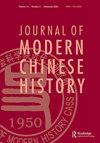The system of government decision-making and its changes in the late Qing
IF 0.1
4区 历史学
Q4 HISTORY
引用次数: 0
Abstract
ABSTRACT The government decision-making in the middle and late Qing Dynasty was mainly shown in the process of how government documents and memorials to the emperor were dealt with. Officials who were authorized with the right to submit memorials to the emperor drafted reports on the state affairs to ask for permissions or offer their own opinions, and the emperor replied to them with absolute power. In the late Qing, the Grand Council (Junjichu), the Six Boards (Bu), Zongli Yamen and other institutions were frequently consulted during the two periods of the empress dowagers’ “administering the state affairs behind the curtain” (chui lian ting zheng), so the higher officials’ role in dealing with state affairs gradually increased. The monarch’s routine approval of higher officials’ suggestions made these institutions to a large extent participated in the daily decision-making. However, the monarch’s authority of final decision-making remained unchanged until the establishment of Yuan Shikai’s cabinet in November 1911 when all government affairs followed the cabinet orders. Then the monarch’s decision-making power became void, and the Qing was actually turned into a constitutional monarchy.晚清政府决策制度及其变迁
清代中后期的政府决策,主要表现在政府公文和御书的处理过程中。被授予给皇帝上书权的官员们起草国家大事的报告,请求允许或提出自己的意见,皇帝以绝对的权力回答他们。晚清皇太后“幕后施政”的两个时期,军机处、六部、宗理衙门等机构经常被征询意见,高层官员在处理国家事务中的作用逐渐增强。君主对上级官员建议的例行批准使这些机构在很大程度上参与了日常决策。这时君主的决策权就失去了效力,清朝实际上变成了君主立宪制国家。
本文章由计算机程序翻译,如有差异,请以英文原文为准。
求助全文
约1分钟内获得全文
求助全文

 求助内容:
求助内容: 应助结果提醒方式:
应助结果提醒方式:


